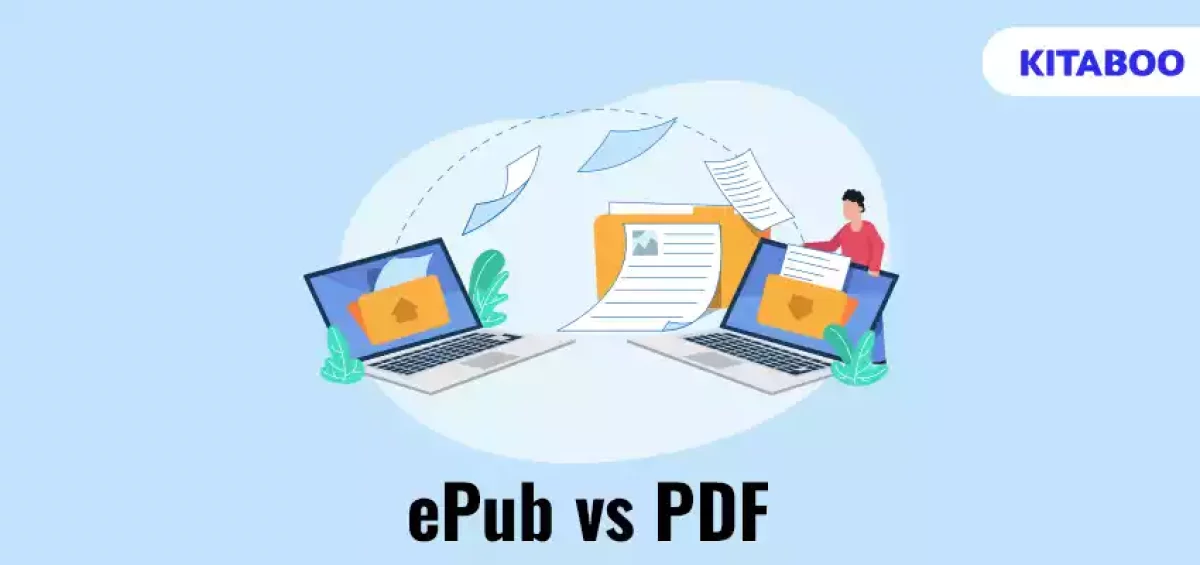With the surge in popularity of eBook readers, ePubs have taken center stage. They are loved for their ability to be read on different devices. But are ePubs really that different from PDFs?
Both electronic publication (ePub) and portable document format (PDF) enjoy widespread popularity among users. ePubs find their niche in electronic publications, while PDFs serve as the go-to choice for storing data across professions.
Yet, when it comes to comparing ePub vs PDF, confusion often reigns supreme. This article aims to clear up that confusion by highlighting the key differences, similarities, pros, and cons of both formats.
Let’s dive into the ePub vs. PDF debate to understand which one might suit your needs better in this age of electronic books.
Table of Contents:
III. ePub vs PDF: Exploring Digital Document Formats
- Device Compatibility
- Reading Experience
- Interactivity
- Accessibility
- Printing
- File Size
- Multimedia Integration
- Ease of Editing
IV. Comparing ePub and PDF: Making the Right Choice
V. Wrapping Up!
What is an ePub format?
The ePub format, or EPUB for short, is like a digital bookshelf for e-books and similar content. It stands for electronic publication, meaning it holds everything from fonts and pictures to text and tables of contents. But what sets the ePub book apart?
First, it’s super easy to access since it’s often available for free. Plus, it’s fantastic for reading on any device, even those with tiny screens as small as 3.5 inches. This means you can enjoy your favorite eBooks wherever you go without squinting at tiny text.
In essence, ePub is the gold standard for eBooks, with its .epub file extension making it easy to spot. And the best part? ePub files don’t care about screen size – they look great on any device.
What is a PDF Format?
The portable document format, commonly referred to as PDF, acts as a digital archive for documents of all kinds. Introduced by Adobe in 1992, PDFs revolutionized global document sharing.
They’re perfect for preserving document layout and content integrity. This makes them ideal for sharing documents across different platforms without worrying about formatting issues.
PDFs come with their unique perks. Unlike other formats, PDFs keep text size consistent regardless of screen size. PDF files are favored in academic and business settings for their non-editable nature.
They also offer two variations: Scanned PDFs, which are image-based, and Native PDFs, which are searchable and partly editable. Additionally, PDFs support interactive elements like multimedia and offer options for adding certificates and passwords for security.
ePub vs PDF: Exploring Digital Document Formats
1. Device Compatibility
While PDFs can be read on devices from major eBook retailers, they often require extensive scrolling and zooming, especially on small screens. Conversely, ePub is the favored format among distributors and retailers.
This is due to its compatibility with devices like Nook and Kindle, offering a seamless reading experience. ePubs can even be converted from fixed to reflowable format effortlessly, unlike PDFs, which may lose their original formatting during conversion.
2. Reading Experience
PDFs preserve the layout of printable documents, leading to challenges like horizontal scrolling and zooming on smaller screens, which impact readability. Fixed-format ePubs offer layout control akin to PDFs, ideal for preserving intricate designs.
Reflowable ePubs, however, dynamically adjust content to screen size, ensuring optimal readability without compromising layout. This adaptability makes reflowable ePubs ideal for digital reading across various devices, providing a seamless experience regardless of screen size.
3. Interactivity
ePubs excel in interactivity, allowing for embedded features like video, audio narration, and interactive elements. This enhances the reader’s engagement and provides flexibility in design and layout.
While PDFs technically support interactivity, it’s often discouraged due to file size and compatibility issues. This makes ePubs the preferred choice for interactive content.
4. Accessibility
ePubs offer greater accessibility for visually impaired readers with features like audio narration widgets and customizable font sizes and styles. This inclusivity makes ePubs more user-friendly compared to PDFs, which lack similar accessibility features.
5. Printing
PDFs maintain layout consistency for both digital and hard copy formats, making them print-friendly. However, ePubs with flowable text require adjustments for printing, as the layout adapts to device screens rather than print dimensions. This poses challenges for physical copies.
6. File Size
ePubs typically have smaller file sizes compared to PDFs due to their use of HTML within a compressed zip file. PDFs, on the other hand, retain character directions, fonts, and layouts, resulting in larger file sizes that may need resizing for different purposes.
7. Multimedia Integration
ePubs offer superior multimedia integration, making them ideal for digital publications with videos, audio, and interactive content. PDFs are primarily suited for text-based documents with minimal multimedia elements.
8. Ease of Editing
PDFs are easier to edit using PDF editors, whereas ePubs may require coding knowledge and familiarity with HTML features. PDF editing typically involves simple clicks within an editor, while ePub editing may require more technical expertise.
Comparing ePub and PDF: Making the Right Choice
Deciding between ePub and PDF depends on the specific requirements of your document. Let’s explore the pros and cons of each format to help you make an informed decision.
1. PDF
Pros:
- Widely used for non-academic and academic articles, office documents, business reports, and presentations.
- Highly compatible with several devices, offering consistent formatting.
- Maintains fixed layout and design across devices.
- User-friendly format with versatile and interactive features.
Cons:
- Larger file sizes can be cumbersome for storage and sharing.
- Content may not fit all screen sizes, especially on smaller devices.
2. ePub
Pros:
- Ideal for electronic publications such as fiction, novels, and stories.
- High compatibility across various devices, including e-readers and smartphones.
- Reflowable text adapts seamlessly to different screen sizes.
- User-friendly and interactive features enhance the reading experience.
Cons:
- Unsuitable for printing due to its fluid layout design.
When choosing between ePub and PDF, consider the nature of your content and how it will be consumed. If your document requires dynamic formatting and interactivity, ePub may be the better choice.
However, for documents that prioritize precise layout preservation and widespread compatibility, PDF may be the preferred option. Ultimately, understanding the strengths and limitations of each format is essential in selecting the one that best suits your needs.
Wrapping Up!
Both ePub and PDF formats have their strengths and weaknesses. The choice ultimately depends on the specific requirements of your content and audience.
Whether you prioritize interactivity, accessibility, or printability, understanding the nuances of each format is crucial in making an informed decision.
If you’re seeking a comprehensive eBook solution, consider KITABOO. As a cloud-based digital publishing platform, KITABOO streamlines the creation, publication, and distribution of eBooks in the versatile ePub format.
Whether you’re an author, educator, or business professional, KITABOO offers comprehensive services tailored to your needs. Ready to elevate your content experience?
Reach out to our expert team today and embark on your digital publishing journey with KITABOO! Request a demo to learn more.
Discover How An Ebook Conversion, Publishing & Distribution Platform Can Help You
Kitaboo is a cloud-based content platform to create-publish & securely distribute interactive mobile-ready ebooks.
You May Also Like








